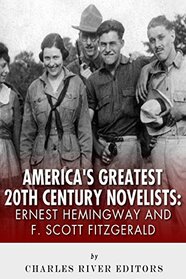Helpful Score: 1
These two men, sometimes friends and often competitors, were some of the lions of the 20th-century writing guild. The author, while recounting the legacy of Fitzgerald, mentioned that he was read far more frequently today than Hemingway.
F SCOTT FITZGERALD -- VG
Fitzgerald embodied the times of which he wrote. He and Zelda, his wife, were as wild and (seemingly) wealthy as the times he recounted in his books. However, F Scott was dead by the beginning of the 1940s and Zelda devolved into mental illness and sanitariums, until her death in 1948. They were flashing lights that crashed and burned too soon (he died at 44; Zelda died at 48 years).
I had to go to the internet to find out what happened to Scottie Fitzgerald (their only child). Another disappointment with this book was the long excerpts of Fitzgerald's notes. After reading the first excerpt (with Scott's misspellings, shorthand, and non-understandable phrases), I was unimpressed with the rest of them. The author would have done better by just paraphrasing.
ERNEST HEMINGWAY -- E
Probably, Hemingway is as famous for his wild living style and controversial death as for his writing. Hemingway was very famous for being a machismo, adventurous man, and cultural icon. Early in this book, readers learn why Ernest spent so much of his life doing 'he-man' things -- his mother dressed him as a girl until Ernest was 6-years-of age. Ernest was bullied by his father and coddled by his mother. The author states that Ernest truly hated his mother; eventually, his father committed suicide.
After careful study, a psychologist felt Hemingway suffered from "bipolar disorder, alcohol dependence, traumatic brain injury, and probably borderline and narcissistic personality traits.." Psychologists often tell us that suicide 'runs in families.' Ernest, a brother and a sister all committed suicide.
F SCOTT FITZGERALD -- VG
Fitzgerald embodied the times of which he wrote. He and Zelda, his wife, were as wild and (seemingly) wealthy as the times he recounted in his books. However, F Scott was dead by the beginning of the 1940s and Zelda devolved into mental illness and sanitariums, until her death in 1948. They were flashing lights that crashed and burned too soon (he died at 44; Zelda died at 48 years).
I had to go to the internet to find out what happened to Scottie Fitzgerald (their only child). Another disappointment with this book was the long excerpts of Fitzgerald's notes. After reading the first excerpt (with Scott's misspellings, shorthand, and non-understandable phrases), I was unimpressed with the rest of them. The author would have done better by just paraphrasing.
ERNEST HEMINGWAY -- E
Probably, Hemingway is as famous for his wild living style and controversial death as for his writing. Hemingway was very famous for being a machismo, adventurous man, and cultural icon. Early in this book, readers learn why Ernest spent so much of his life doing 'he-man' things -- his mother dressed him as a girl until Ernest was 6-years-of age. Ernest was bullied by his father and coddled by his mother. The author states that Ernest truly hated his mother; eventually, his father committed suicide.
After careful study, a psychologist felt Hemingway suffered from "bipolar disorder, alcohol dependence, traumatic brain injury, and probably borderline and narcissistic personality traits.." Psychologists often tell us that suicide 'runs in families.' Ernest, a brother and a sister all committed suicide.




